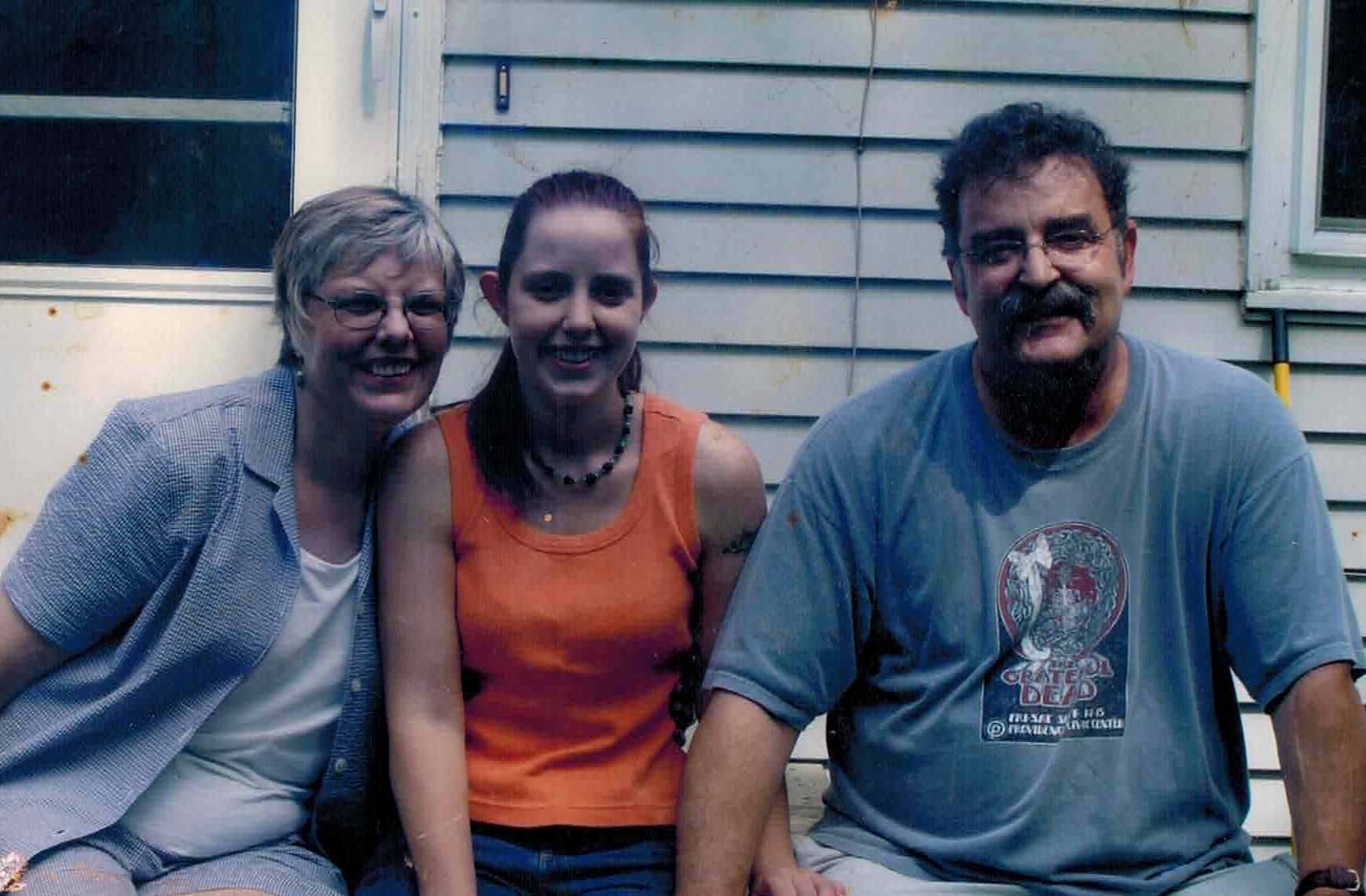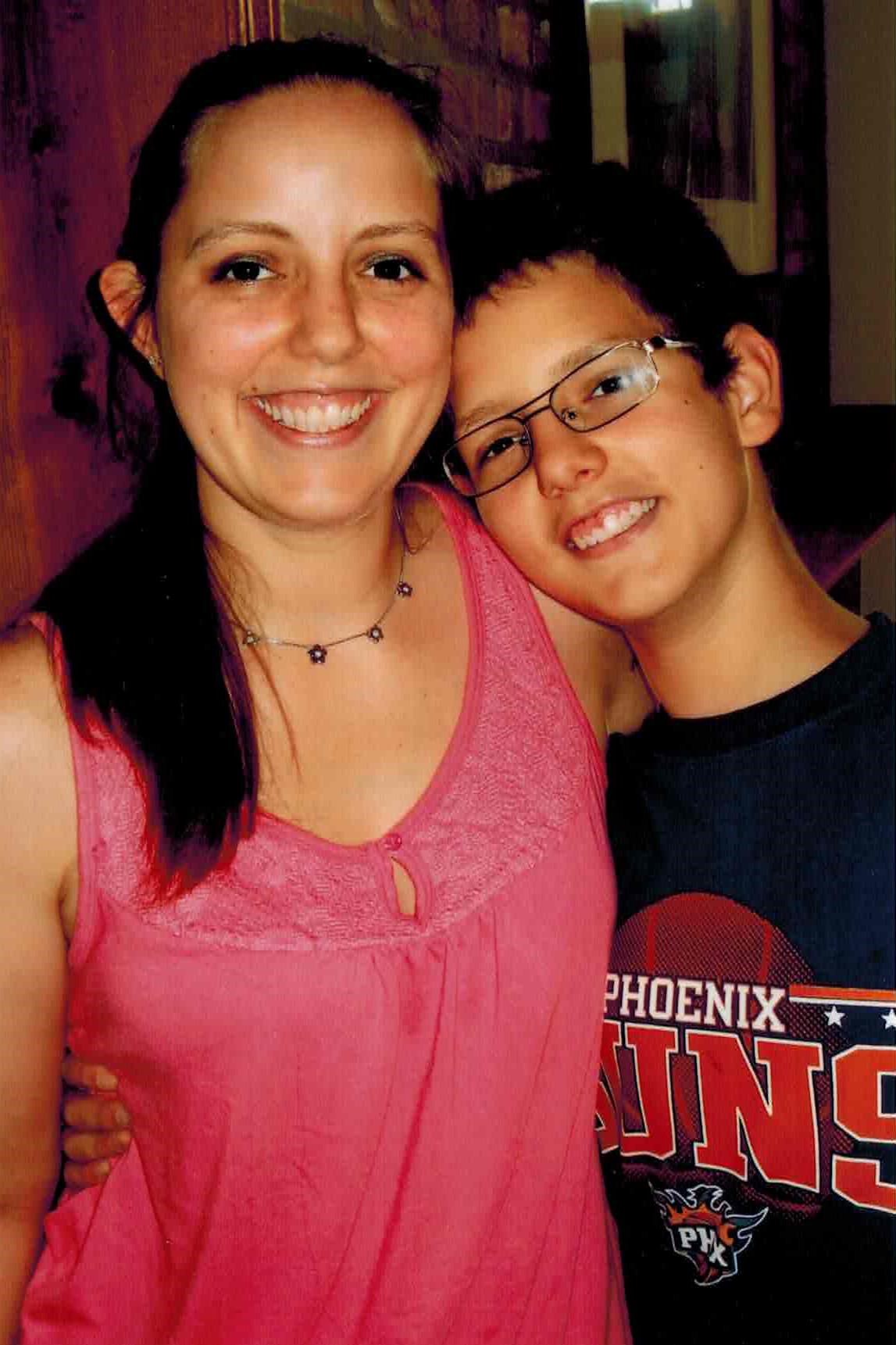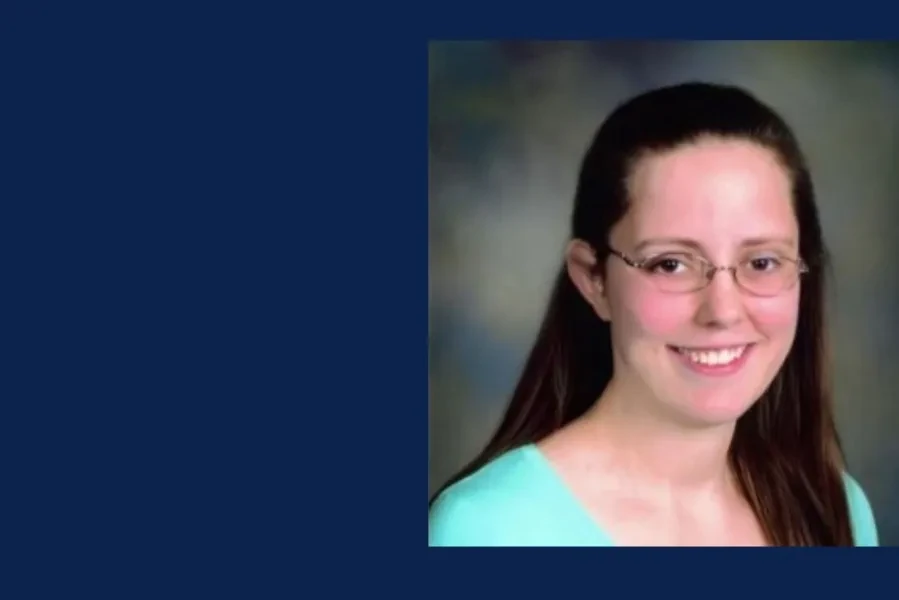Although her mom was an elementary school teacher her entire childhood, faculty member Dr. Dana Dillard never intended to become a teacher herself. Despite growing up with a father who suffered from severe mental illness and becoming pregnant at the age of 19 while in an abusive relationship, Dr. Dillard instead focused on her education and her son. Now she is celebrating nearly a decade at the University of Arizona Global Campus (UAGC).
In 2012, Dr. Dillard started as an assistant professor. As Core Faculty and Assistant Professor for the Department of Behavioral Sciences in the College of Arts and Sciences, Dr. Dillard primarily teaches Physiological Psychology in the Bachelor of Arts in Psychology program and Psychopharmacology in the Master of Arts in Psychology program.
One of the discussions Dr. Dillard covers in every class is a term from the psychology textbook “amicable skepticism” — one of the mantras she has always lived by in her life.
“What I want to emphasize is a really critical look at research because too often we toss around the word ‘prove’ – somebody proved something – and in our discipline we don’t prove anything,” she explains. “We need to look at research, we need to understand its limitations, and we need to question everything we see and hear about the research so that we can understand whether or not it’s relevant.”
Read on to learn more about our Faculty of the Month and her path to becoming a highly respected UAGC psychology professor and proud mom of a college graduate.
Life Lessons
As children, Dr. Dillard and her older sister grew up in a small, rural town in Illinois with a population of a mere 480 people. Their mom was a third grade teacher, and their dad worked labor jobs, though Dr. Dillard says his calling was as a fine art painter.
However, he also struggled with mental illness.
“He managed to find a treatment that worked to stabilize his mental health — while still allowing him to be creative — when he was diagnosed with chronic lymphocytic leukemia.”
Dr. Dillard saw first-hand the positive effects art had in her dad.
“Painting was what helped him fight his demons,” recalls Dr. Dillard. “Losing that ability through ineffective treatments was torture. It made me so aware of the limits of how we define health and wellbeing.”

Dr. Dana Dillard enjoys spending time with her parents.
While in her teens, Dana Dillard was faced with a frightening experience that would ultimately provide her with her “why” in life.
She recalled getting pregnant at 19 while in an abusive relationship.
“I stayed with him for another two years,” she recalls. “I could not see what he was doing to me, but I watched one day as my son was trying to get his attention. And, only 15 months old, he was denied that attention. My son’s reaction was to run to the wall and bang his head against it. This was my wake-up call, and I fled for my parent’s home, which was 3,500 miles away, with nothing but my son’s clothes.”
She continued: “I was fortunate that my parents were able to get me a plane ticket, but I have never been more terrified trying to get to the airport with my son. I learned my why from that experience. My son is my why. He is the sole reason that I did not become the statistic that my doctor told me I was destined to become when I was pregnant at 19 and struggling to escape abuse. Everything I have done has been to give him the future that I almost denied him.”
In a roundabout way, it was her myriad experiences with psychologists and psychiatrists that led student Dana Dillard into becoming Doctor Dana Dillard.
“As I was growing up, I wanted nothing to do with psychology. I hated everything about psychology,” she states. “In my experiences, everything with psychology and psychologists made our lives worse. When I realized my son was suffering from developmental delays and a developmental disorder, all of my angst made me realize that the one thing I needed to learn was psychology. I needed to understand his behaviors and his needs and how I could best meet them,” says Dr. Dillard.
“So I went back to school to study psychology. And from there, I learned that psychology is not about mental illness. It’s about wellbeing and understanding. It brought me full circle to realizing that my passion lies in this field and looking at behavior in ways that we can improve conditions so people don’t have to go through what our family went through.”
Looking Back
When Dr. Dillard’s son was 15 months old, he suddenly stopped speaking for no apparent reason.
She went all the routes to see if it was his hearing and to figure out what went wrong, and she was a young mother not being listened to.
“When my concerns were not being heard, I needed to study psychology and develop strategies to help him on my own,” she says. She and her mom started teaching him sign language, and when he was about four years old, he was able to express his feelings in a way he couldn’t before and signed his first phrase to his mom, looking at her and signing, “I love you.”
Sign language gave him confidence and they started to see changes, though there were still plenty of delays present.
Dr. Dillard enrolled her son in speech language therapy, but after three years, they discontinued services because there was no formal diagnosis and she was told he was “too smart” and “too good with the materials” to continue.
She was then able to find an occupational therapist who diagnosed her son with Pervasive Developmental Disorder. She was able to get some services at school, but Dr. Dillard says her son didn’t get enough support, so she went back to school to learn more.
Dr. Dillard also enrolled her son in violin lessons, swimming, taekwondo, and more. “We tried to provide options for him as he was navigating what is a cruel world sometimes.” In high school he figured out his path. He attended community college, got a leading role in a play, then went on to college to earn his degree, a year early.
“My son is a spectacular young man who recently graduated from college with a degree in Computer Sciences and minor in theater (and almost a minor in Japanese, though the pandemic made it impossible to fulfill the final requirement). And, it is through him that I see what is possible when people are quick to judge with limited information.”

Dr. Dana Dillard, shown here with her son, draws from her personal experiences to help guide her instructions at UAGC.
Meanwhile, Dr. Dillard went on to earn a BS in Psychology, an MS in Psychology, and a PhD in Health Psychology. While attending school online, she worked at the local YMCA teaching a group of older adults a Pilates mat class. She was hooked on teaching right away.
“Who knew that would lead to where it did?” Dr. Dillard says.
“I always knew I enjoyed giving others access to information, but I never thought I would enter the educational arena. There is something life-changing about sharing knowledge. In my classroom, I take on the role of learner as often as I take on the role of instructor. I may have some weird, interesting, or obscure knowledge about psychology, but I do not have the life experiences, culture, family, or traditions that my students bring into the classroom. I may have a little bit of expertise on one subject, but every student has expertise in their life. The magic in teaching happens when we get to listen to each other’s expertise and create new connections.”
“I get to come into a classroom every day, talk about what I love, and share ideas on how we can make the world better. This is not work or a career. It is so much more,” Dr. Dillard says proudly.
In addition to teaching at UAGC, Dr. Dillard also teaches “Introduction to Psychology” at local high schools during the fall semester through the community colleges. “I think that we can learn so much from each other’s experiences. Teaching such diverse classrooms really makes me appreciate those experiences.”
Getting to Know Dr. Dana Dillard
We recently spoke with Dr. Dillard about her experiences and how she is using them to guide her instruction at UAGC. Here is what she had to say about higher education, psychology, online education, connecting with students, and more.
UAGC: What is your opinion on the importance of higher education?
Dr. Dillard: This is a very loaded question because I think there is a misunderstanding of what higher education is. There is nothing in life that I believe is more important and life-changing than education. For me, I needed a college degree to get access to information so that people would listen to me to get the help I needed for my son. Once I was able to help him, I realized I needed additional degrees to help other people and parents find their voice to advocate for themselves or the ones they love.
Education is empowering – it makes paths accessible that are otherwise completely out of reach and is the only way that we are going to make the social change that is so desperately needed. But I do not believe that higher education is the right path for everyone, and I think we are doing a disservice by suggesting that a college degree is the only kind of higher education that counts. Higher education includes trade schools and vocational schools, and hopefully, legislation will also support apprenticeships as a path to or through higher education.
UAGC: What is a topic in psychology you like to repeatedly teach to your students? Why?
Dr. Dillard: Health psychology and physiological psychology are my favorite courses to teach because we get to examine behavior in a way that is completely different from other approaches. Although I love the patterns, paths, and beauty of the nervous system and its intersection with wellbeing, as a teacher, what I love is watching how the new approach requires a reset of beliefs or at least a critical examination of them to accommodate the new information.
In addition, many students feel intimidated by the biology and chemistry of the discipline, perhaps because they have been told in the past that this is not a subject they would do well in. I get to watch as students master concepts that they were told were not for them – and watch further as they get to imagine the possibilities of how they can create change. It is a gift.
UAGC: What do you appreciate most about your career at UAGC?
Dr. Dillard: Without a doubt the people. My students are incredible, and I learn something new with every interaction. I am also fortunate to work with the most amazing colleagues. There is a shared vision for supporting students and faculty that is unlike anything I have experienced.
I love that we are making education accessible to people who may have not otherwise had the opportunity. I see UAGC as thought leaders in the field of online education, all about engaging students and helping them reach their potential. For students to know that they can do it, they have value, we see their expertise. It’s life-changing.
UAGC: What do you like most about online instruction?
Dr. Dillard: I love finding ways to create connections. People choose online school for many different reasons, and sometimes a lack of connection can become a major barrier to success. I think that the challenge of creating connections is one of the things that makes it so interesting. There is power in the written word that can support making genuine connections, and this can also be supported by action and by being visible in other mediums.
UAGC: Do you connect with other faculty and staff at UAGC? If so, how do you “connect” in an online environment?
Dr. Dillard: I absolutely connect – communication occurs in many different mediums, and these have translated to other opportunities to connect. Our program hosts social hours for full-time and associate faculty, and these hours have led to additional collaborations in writing, publication, and research.
I am on the Faculty Advisory Board for the Psych Club along with some other truly amazing people – Michelle Rosser-Majors, Stephanie Stubbs, Cara Metz, and Felicia Banks. The Psych Club is yet another forum where we regularly connect. There are virtual coffee hours and Zoom drop-ins – just as in any office, the barriers that are present are the ones we put up.
I am a member of Toastmasters – an organization I strongly encourage anyone at UAGC to join. I use Toastmasters as another medium to connect with faculty, staff, and students. Connecting in the online environment just requires a little imagination and re-envisioning of what it means to connect.
UAGC: What are your hobbies/special interests outside of work?
Dr. Dillard: My partner is passionate about beekeeping. I help manage his “hobby” apiary. This last year we were trying to manage around 20 hives – so far it looks like all but three survived the winter, which is miraculous as I was also helping my partner navigate the aftermath of a heart attack and quadruple bypass surgery. Working with bees requires that you attend to your personal energy – the energy you give off is reflected back to you, and the bees are very quick to identify a bad mood – and you can’t fake it with them, either.
Also, I am obsessed with languages – there is a logic to language that I love to decipher. There is an underlying logic (and I love logic puzzles) to languages, math, and coding that is poetic and beautiful, and I love seeing those patterns emerge. I have attempted to learn Spanish, French, Italian, and Polish, and I want to learn languages that are outside of these families of languages to learn more patterns. I somehow manage to learn enough to get myself into trouble but not enough to get out of trouble.
I love to dance. I am a gamer, a reader, and a dreamer. I love to walk in the parks with whichever dog has decided to stay with us at the time and just breathe in the beauty that is around us all the time. I like to go outside and just listen. Like this morning, I was delighted to hear after another cold snap that the two pairs of doves who come to our trees had stayed despite the weather change. They were cooing up a storm this morning, and it was incredible.
UAGC: What do you love most about teaching?
Dr. Dillard: I get to see the world in a new way every time I have an interaction with a student. I get to bring information in and then they transform it into their own understanding and I get to step back and say, “I never got to see the world like this before.” And so while I like to think I am influencing their lives, they’re changing me every time I talk with them.
UAGC: What future plans do you have as far as your teaching career?
Dr. Dillard: I would love to go back for more degrees. I am really interested in getting a degree in statistics and quantitative analysis.
--
Charlene Melson is a contributor to the Forward Thinking blog.
Certain degree programs may not be available in all states.
